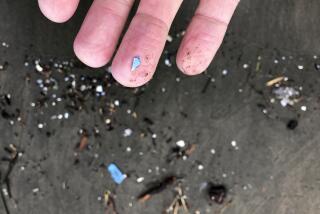More Bad News for Inotropic Heart Drugs
- Share via
Results from a clinical trial reported last week may sound the death knell for a family of heart drugs called inotropic agents. Inotropic drugs are meant to help the diseased heart pump blood more easily, but a variety of studies have suggested that they are a threat to the users. The new study confirms that threat.
Clinical trials with three earlier inotropic drugs--milrinone, pimobendan and flosequinan--suggested that they provided some benefits in the short term with respect to quality of life but that they increased the risk of dying.
Researchers had higher hopes for a new drug called vesnarinone, and results from a six-month trial reported in 1993 suggested that there were 62% fewer deaths among those who took a 60-milligram dose than among those who took a placebo.
That analysis did not include deaths among a group who took a higher dose of the drug, however, and the Food and Drug Administration demanded a longer trial of vesnarinone. Results from that trial were reported Thursday in the New England Journal of Medicine.
A team of researchers headed by Dr. Jay N. Cohn of the University of Minnesota Medical School enrolled 3,833 patients, who received either 30 milligrams of vesnarinone daily, 60 milligrams daily or a placebo. Patients were followed an average of 285 days.
Cohn’s team found that there were significantly fewer deaths in the placebo group (18.9%) than in the 30-milligram (21%) and 60-milligram (22.9%) groups, and that the average time to death was significantly shorter in the 60-milligram group.
Quality of life was higher in the 60-milligram group, but the team concluded that the benefits were not sufficient to outweigh the increased risk of death. It now seems unlikely that the drug will be resubmitted to the FDA, the researchers said.
*
More Support for Hormone Therapy
A Finnish study provides further evidence that hormone replacement therapy with estrogen protects women against death from heart disease with no increased risk of breast cancer.
Dr. Leif Sourander and his colleagues from the University of Turku studied 7,844 women born between 1923 and 1930 who were screened for breast cancer, and followed up from 1987 to 1995.
They reported in Saturday’s Lancet that women taking estrogen were 79% less likely to die from heart attacks than those who were not receiving the hormone. No increase in breast cancer was associated with hormone replacement therapy, but there was an increase in endometrial cancer.
*
Questioning Sunscreen’s Protection Level
Sunscreen use may not provide as much protection against skin cancer as researchers had previously believed, according to a new study. In fact, the use of sunscreen may encourage children to spend more time in the sun and thereby increase their risk, the study found.
Dr. Philippe Autier and his colleagues from the European Institute of Oncology in Milan studied 631 Caucasian children and reported in Wednesday’s Journal of the National Cancer Institute that those with the highest use of sunscreen had the largest number of sun-caused moles. Moles are a good predictor of later skin cancer.
Officials of the National Cancer Institute cautioned that the study should not discourage use of sunscreens when children are outside. Rather, it should encourage the use of protective clothing.
*
Flu Shot Benefits Outweigh Risks
Flu shots can slightly increase the risk of a rare nerve disease called Guillain-Barre disease, but the benefits far outweigh the risks, researchers reported in Thursday’s New England Journal of Medicine.
Dr. Tamar Lasky and his colleagues at the University of Maryland School of Medicine found that one case of Guillain-Barre occurs for every 1 million vaccinations, meaning that about 60 to 70 Americans will develop it every year as a result of flu shots. Guillain-Barre can damage nerves, cause weakness in the limbs and, in some cases, produce paralysis. Influenza, in contrast, kills 20,000 unvaccinated Americans every year.
*
Study: Shots Cure Some Reactions to Dust Mites
Allergy shots, long controversial because of questions about their efficacy, have cured some children of their reactivity to dust mites in a 10-year study in Japan. Such shots have been used for 80 years, but recent studies have suggested that they are no more effective than drugs in relieving symptoms of allergies.
Proponents, however, say that most physicians receive no training in treating allergies or using the shots and that vaccinations are frequently not used properly.
Dr. Yoshihiro Ohashi and his colleagues at the Osaka City University Medical School studied two groups of children who were allergic to dust mites. Half received shots and half were treated with an over-the-counter medication sold in this country as Nasalcrom. Ten of the 19 who received shots were symptom-free at the end of the study, compared to none of those receiving the drug.
*
Musician’s Practicing Caused Mini-Strokes
Trumpet playing can potentially be hazardous to your health, German researchers report today in Neurology. Dr. Stefan Evers of the University of Mnster reported on an “ambitious” 17-year-old trumpet player whose face started tingling during intense trumpet playing. He sought help after an episode partially paralyzed one side of his body for a few hours. Evers determined that the boy was suffering transient ischemic attacks, or mini-strokes--brief episodes when a blood vessel was blocked, momentarily disrupting blood flow to the brain.
Evers discovered that the boy had a patent foramen ovale, a small opening between two chambers in the heart that has previously been associated with mini-strokes. About one-third of the general population have such small holes without overt effects.
Evers speculated that the intense pressure in the chest from the trumpet playing forced air bubbles into the bloodstream, where they could follow blood flow into the brain and temporarily block capillaries. Surgically closing the hole corrected the problem.






